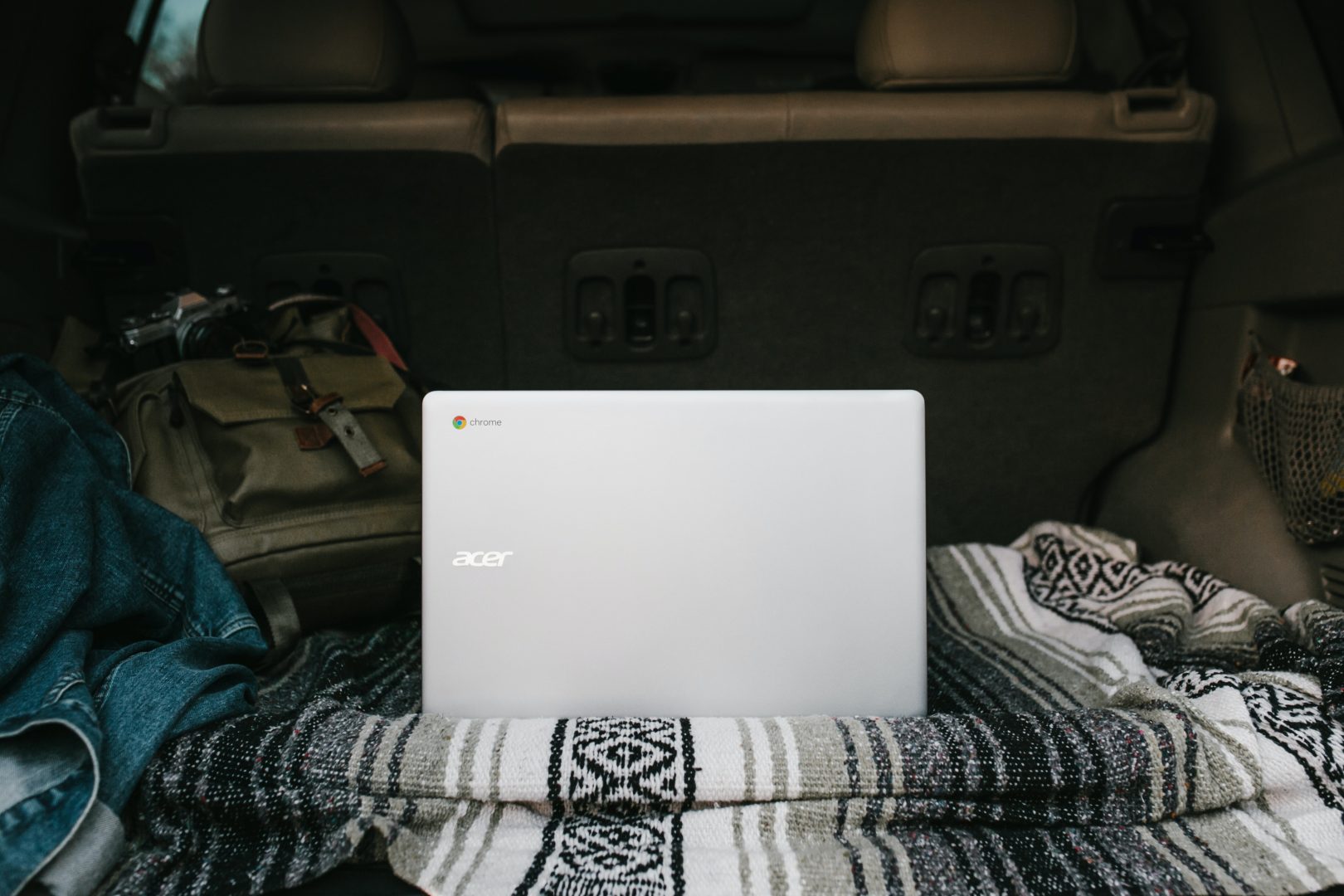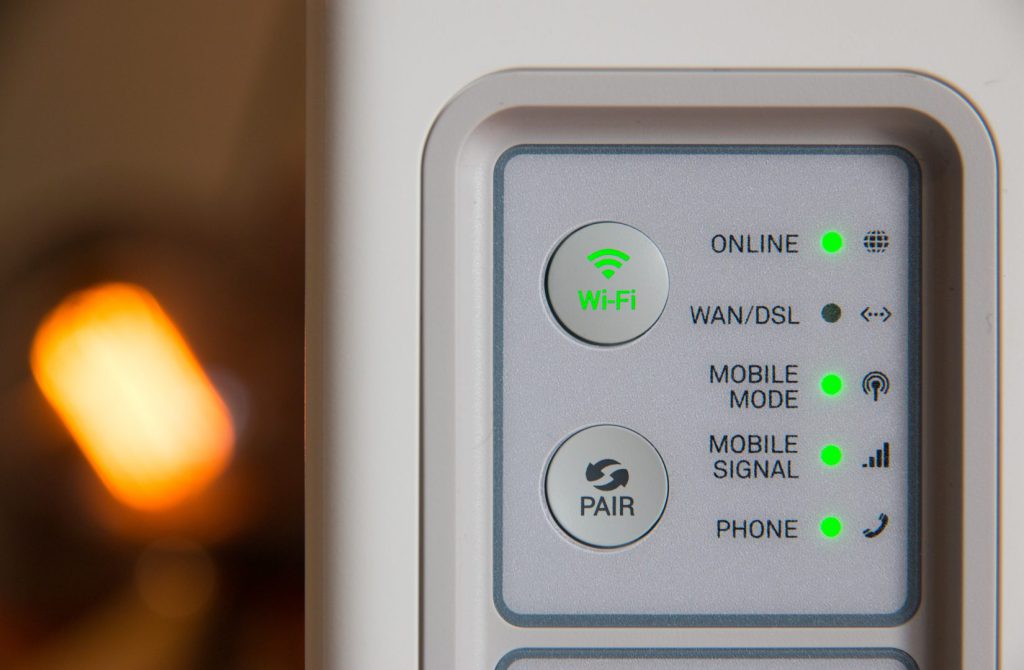

It’s the 21st century, and at least a few of Pixar’s “Wall-E” predictions have come true. Pretty much everything we do these days, we do online — so if you’re going to be spending significant time in an RV, you’re probably wondering how to get RV internet.
The bad news is, there’s no one easy answer to this question. Staying
connected will depend on where you’re staying, what kind of surfer you are, and more. But that bad news is also good news because it means there are plenty of ways to secure internet for your RV, which means you’re bound to find an option that will work for you.
In this post, we’ll walk you through everything you need to know to stay connected, from figuring out how a hot spot works the answer to the common question, Do RV parks have Wi-Fi?
Read on to learn all you need to know about how to get internet in an RV, whether you’re a power user or just a casual surfer.

What Are My RV Internet Options?
The first thing to understand about internet for RVs is that there are a variety of RV internet options — which is to say, different sources for your signal. Your access to these different sources will vary depending on where and how you camp, but here are the basic options for RV internet:
- Satellite – dedicated internet service from a satellite provider like HughesNet or Viasat. This is an expensive option that works best for remote regions.
- Cellular data – a one-stop shop for internet and telephone needs. This is the connectivity you likely already have on your smartphone. Depending on your travels, cellular can provide excellent service, but the cost skyrockets if you use too much data — and in some remote locations, your device won’t be able to connect to a tower.
- Public WiFi – coffee shops, RV parks, and truck stops often provide this. Public WiFi is a great temporary option, but it is not a serious solution for ongoing internet access, because your access to it can vary significantly depending on where you are. For example, if you’re boondocking in a remote location, it’s going to be tough to trek out to a local Starbucks to nab a few minutes of connection!
- DSL or Cable – an awesome high-speed internet option, but only for “the RV park bound.” If you plan to travel, this is not a viable option.
What is the Best Wi-Fi for My RV?
Now that we’ve laid out the basic options for internet for RVers, you’re probably thinking, “Okay… but how do I figure out which one’s right for me?”

It’s a great question. But the truth is, the best internet for your RV really depends on what kind of surfer (and camper) you are. For example, if you most frequently stay at posh RV parks that offer high-speed WiFi, you may be able to get by on those connections alone — whereas if you’re more into boondocking in the wilderness, you’re probably going to need satellite or strong cellular data. By the way, keep in mind that the “high-speed” WiFi advertised at RV parks is often anything but, and with one connection covering an entire campground, you may need a signal booster or Wi-Fi repeater to pick up the connection at all.
Furthermore, if you’re a full-timer working from your mobile home, staying connected isn’t just a convenience — it’s a requirement. Whereas those of us who are simply scrolling through Instagram can afford to take a couple of days off(line) every once in a while.
In most cases, your best RV WiFi option is actually going to be a combination of services. RV internet is not a one-time installation, unlike your modem at home. If you are traveling, you will have to determine what type of connection works best in each location.
Here’s an example. Let’s say you need to write a few “non-security” emails (you know, just a note to a friend, etc.). You park at a McDonald’s because they offer free internet. From inside your coach, you may be able to connect to free Wi-Fi and send your message via Gmail. The cost? $0.00 (unless, of course, you run in for a few fries. ? ) The security, however? NONE. The speed? Will seriously vary.
Once you are back on the road, you decide to do some banking. This is a security-oriented task. You do not want to have your information hanging out for the whole world to see. In this case, you should use a more secure connection, like the data connection on your smartphone or iPad. Cellular data plans will often provide you with the best security for this type of mobile internet activity. The cost? It depends on your usage and may vary anywhere from $50 to more than $300 per month.
This brings us to another important consideration.
How Much Does RV Internet and Wi-Fi Cost?
If you’re like most of us, your travel budget is limited. And although there are lots of smart ways to save money on the road, the cost of staying connected can be significant.
Cellular Data
Let’s take the easiest RV internet option: cellular data. This can get you a pretty reliable, fast connection that’s available in a wide variety of locations, but many carriers make you pay per gigabyte of data, and it can really add up.
Take, for example, Google Fi — the internet megalith’s homespun cellular plan, which helps users save money by charging a low, flat rate for talk and text and then charging per GB of data. For the first 6 GB, you’ll pay $10 per — which is actually pretty reasonable. A gig of data is a lot to go through, unless you’re streaming video, gaming, or doing some other intensive internet activity.
After that first 6 GB (and $60), you’ll get free data — until you hit 15 GB. Then, the data will still be free, but it’ll be seriously throttled. You’ll have the option to go back to the $10/GB for full speed, but at that point, you could easily go over $100 on data alone.
The major carriers, like Verizon, AT&T, and T-Mobile, do offer unlimited data plans, but rates change and throttling can occur. To find the most affordable option, the best option is to do the research on your current mobile carrier and compare it to what’s currently on offer from the other carriers. It may be worth switching if you can find something with a more affordable monthly rate.
Satellite Internet
On the other hand, there’s satellite internet, which might cost as little as $50 per month but require upfront installation costs and equipment rental fees. Or, of course, you could just run out to grab a latte every time you need to do some online banking… to the tune of about $5 a pop, which could add up to about $300 over the course of a month.
As with all things RVing, your costs will vary — flexibility and customizability are two of the most attractive parts of this kind of travel. It can be helpful to figure out what kind of surfer you in order to more accurately estimate your budget.
Mobile Hotspot
The other most common type of RV wireless internet is a standalone hotspot, which most of the cell phone carriers in the United States sell. These are small devices that allow you to access a wireless data plan with a given number of computers and tablets. In some cases, you’ll pay for a given amount of data up front, whereas other plans have a month-to-month contract just like your cell phone.
Obviously, if you’re only going to be using your mobile WiFi hotspot from time to time during weekend excursions, it doesn’t make sense to sign a contract that’ll make you pay every single month. So be sure to look for a personal hotspot that comes with a pay-as-you-go program, so you don’t end up wasting money on a service you don’t use.
You might also score a deal if you get a hotspot through your existing wireless carrier. For example, if your phone bill comes from Verizon, look for a Verizon hotspot, such as the MiFi 6620L Jetpack 4G LTE. Keep in mind that different hot spots come with different features and compatibilities, and also that they are still limited by the carrier’s coverage.
Here are a few hot spots from different mobile providers.
- Verizon MiFi 6620L Jetpack 4G LTE Mobile Hotspot
- AT&T Unite No-Contract 4G LTE Mobile WiFi Hotspot
- T-Mobile LTE Mobile HotSpot V100T
Are you a casual surfer?

Description: If you are a casual surfer, you use the internet for basic banking, email, and occasional Facebook posts. You might read the news online. You rarely watch YouTube, and never download movies.
Prescription: For the casual user, a basic cell phone package with 3 or 4 GB of data will probably work fine. Verizon or AT&T may be preferable, as they currently have the best U.S. coverage. Watch for a screaming deal, to get the most data possible for your money. If you are on a super tight budget, the casual surfer can survive on free WiFi alone. (Note: DO NOT do your banking or personal transactions on FREE WIFI!)
Must Haves: Smartphone, tablet, or laptop. Might consider a Wi-Fi booster to increase free RV internet connectivity. (See suggestions below.)
Are you a socialite?

Description: If you are an internet socialite, you connect to every social media possible. You love to post, tweet, email, pin, and Instagram, whenever possible. YouTube is your friend, and you find yourself watching cat videos WAY MORE OFTEN than you will admit.
Prescription: Socialites need data like fish need water. Cell phone data plans are what allow you to connect to the internet. Be aware, RV internet is not like at-home internet. Videos take up a lot of data and can cause you to go over your data limit if you are not careful. You’ll want to look for at least 10 GB of data or even an unlimited plan, which you can use on any of your internet-enabled devices.
Must Haves: Smartphone, tablet, or laptop, and cellular signal booster for RV internet inside your rig. (This will help you connect in more places with more bars.)
Is The Internet Your Lifeline?

Description: If the internet is your lifeline, you might work online. If so, you do everything from uploading videos and audio clips, to writing, editing, Skyping, and more. If it’s done from a virtual location, you are doing it!
Prescription: You will need a variety of internet options. Lifelines need to use FREE WIFI whenever they can grab it, but you will also need a solid cellular plan with at least 4o GB of data. It’s important to watch your usage, and stay away from overages. You might also consider having more than one cell phone contract. Verizon is stronger in some areas of the country, and AT&T is more available in others. If you can’t be without the internet, you may need to spread your data between 2 companies, and make sure you stay connected at all times.
Must Haves: Smartphone, tablet, computer, WiFi booster, cellular booster, possibly MiFi connectors, or additional hot spot tools for RV internet inside your rig.
Are You Joined At The Hip?

Description: The Hipster connection borders on addiction. If the internet is your passion, you may find yourself discouraged with RV travel. RV internet is not always available, no matter how many gadgets you have. If you HAVE TO BE ONLINE at all times, you may have to stay still more often.
Prescription: Park your RV at an internet-rich, phone or cable-ready site. Stay parked for several months at a time, and buy cable internet or DSL from the local provider. You will have fast internet all the time. You will also need a serious cellular plan to cover all your data needs throughout your day!
Must Haves: An RV park with high-speed internet opportunities. This will provide THE FASTEST RV internet option available.
Can I Get Satellite Internet for My RV?
One of the most popular RV internet service choices for serious travelers is satellite internet, since it allows you to get a fast connection anywhere you can see the southern sky. That said, if it’s not set up right or you’re not in a location clear of trees and obstacles, you may experience a high amount of latency — and both the monthly and initial set-up costs are pricy!
What’s more, the bulky equipment necessary to use a satellite connection — which does, after all, beam down the internet from SPACE — adds a lot of weight to your setup, which can be problematic for those with travel trailers who are weight-conscious about their rigs. And keep in mind that home satellite internet is not at all the same as RV satellite internet service; you have to specifically seek out mobile-friendly satellite options, if you’re going to go that route.
How Do Full-Time RVers Get Internet?
Full-timers are, perhaps, the group that’s most impacted by the difficulty of staying online on the road — particularly when they’re still working while traveling. But even for retirees, you need WiFi for great RV living: it’s hard to get by without access to your digital banking subscription, social media, and streaming television services that help keep your mobile home feeling like, well, home.
The best WiFi option for full-time campers will, as mentioned above, likely be a combination of two or more services; full-timers may also benefit from purchasing gadgets like Wi-Fi extenders to increase their chances of being able to take advantage of RV park connections. That said, most full-timers do combine their use of public WiFi with data or satellite connections to ensure they can stay in touch even when they’re far afield.
RV Internet Tips and Tricks
Here are a few more tips and tricks to help you find the best RV internet option for you.

Which Option Is Easiest?
The easiest option is cellular, by far. It is not, however, the cheapest. So watch for special offers before you sign any contracts. Most smartphones can be used as Wifi hotspots. You simply push a few buttons within your phone, and your phone shares its RV internet connection with your tablet or computer. It’s an easy process once you get it set up. Plus, this hot spot will be available to a wide variety of WiFi-connective devices: smartphones, tablets, iPads, etc. WiFi-friendly technology will work together with the least amount of hassle.
Additional Tips & Tricks:
- Apps – There are several apps available that show coverage regions for your cell phone. If you plan to use your cell phone as your main source of internet, consider downloading an app like Coverage for your iPhone.
- Preparation – Know your route, and plan around your needs. Plan high-usage activities when you have good coverage on your smartphone, and do them all at once. If you have solid internet coverage, try to batch your activities, and once again, do them all at once. You never know how the coverage will be “down the road.”
- Boost Your Signal- There is a ton of gadgets that can boost your ability to get online. If you are a casual user, don’t bother. If you depend on the internet for your work, a Wi-Fi repeater can be an invaluable investment.
- Understand GB and Overage – We can’t emphasize this enough! If you are using your cell phone to consume internet, you have to monitor your usage. It’s easy to use WAY MORE internet than you intend to. You may want to try dividing your GB into 31 days of the month. That way, you know how much you can use PER DAY without triggering an expensive overage charge. (Oh, and you better find out what the 0verage costs are before you sign a contract!) If you have more data than you need by the end of the month, then you have internet to burn. Download or stream some movies, or watch the latest doggy videos on YouTube.
- Go Old School – Using a Roku to stream T.V. works great with landline internet. Using RV internet? Then consider using RedBox or Netflix, in DVD or BluRay format. When you watch a movie on DVD or BluRay, you avoid using precious internet data, and you save a boatload of money! (If parked with cable or Direct TV, you don’t have to worry about how many movies you watch.) Just be careful when you are using your phone or computer for these types of activities!
Need a Posse?
More questions? The best way to get the answers you need for your specific rig are to join a posse, and get answers from the experts. You can get more information by joining RVmobileinternet.com. You can also pick up the book Mobile Internet Handbook, available at Amazon.
Looking for more? Check out our blog post on how to install wifi in your RV.
This post contains affiliate links. RVshare may receive compensation if you make a purchase after clicking on a product link.
